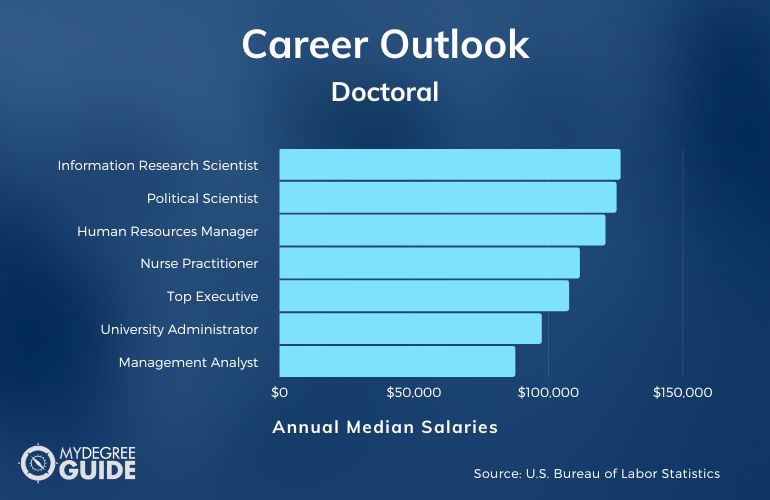Online doctoral programs can provide a smart, flexible path toward a top degree in your field.

For working professionals, earning online degrees can provide an invaluable way to gain expert-level knowledge and advance your career opportunities.
Editorial Listing ShortCode:
Through online doctoral study, you can become a leader in your field.
Universities Offering Online Doctoral Degree Programs
Methodology: The following school list is in alphabetical order. To be included, a college or university must be regionally accredited and offer degree programs online or in a hybrid format.
1. Capitol Technology University
Capitol Technology University is accredited by the Commission on Higher Education of the Middles States Association of Colleges and Schools.
2. City University of Seattle
The City University of Seattle is accredited by the Northwest Commission on Colleges and Universities.
3. Clemson University
Clemson University is accredited by the Southern Association of Colleges and Schools Commission on Colleges.
4. Franklin University
Franklin University is regionally accredited by the Higher Learning Commission.
5. George Washington University
GW is regionally accredited by the Middle States Commission on Higher Education.
6. Gwynedd Mercy University
Gwynedd Mercy University is accredited by the Middle States Commission on Higher Education.
7. Indiana University
Indiana University is accredited by The Higher Learning Commission.
8. Iowa State University
Iowa State University is accredited by the Higher Learning Commission of the North Central Association of Colleges and Schools.
9. Johns Hopkins University
Johns Hopkins University is accredited by the Middle States Commission on Higher Education.
10. Keiser University
Keiser University is accredited by the Southern Association of Colleges and Schools Commission on Colleges.
11. Mississippi State University
Mississippi State University is accredited by the Southern Association of Colleges and Schools Commission on Colleges.
12. Northeastern University
Northeastern University is regionally accredited by the New England Association of Schools and Colleges, Inc.
13. Nova Southeastern University
NSU is accredited by the Southern Association of Colleges and Schools Commission on Colleges.
14. Pennsylvania State University – World Campus
Penn State World Campus is regionally accredited by Middle States Association of Colleges and Schools.
15. Regent University
Regent University is accredited by the Southern Association of Colleges and Schools Commission on Colleges.
16. Saybrook University
Saybrook University is accredited by the Western Association of Schools and Colleges Senior College and University Commission.
17. Texas Tech University
Texas Tech University is accredited with the Southern Association of Colleges and Schools Commission on Colleges.
18. Touro University Worldwide
Touro University Worldwide is accredited by the WASC Senior College and University Commission.
19. Union University
Union University is accredited by the Southern Association of Colleges and Schools Commission on Colleges.
20. University of Alabama
The University of Alabama is accredited by the Southern Association of Colleges and Schools Commission on Colleges.
21. University of Florida
The University of Florida is regionally accredited by the Southern Association of Colleges and Schools.
22. University of Kansas
The University of Kansas is accredited by the Higher Learning Commission.
23. University of Missouri
The University of Missouri is accredited by the Higher Learning Commission.
24. University of Nebraska – Lincoln
The University of Nebraska-Lincoln is accredited by the Higher Learning Commission.
25. University of North Dakota
The University of North Dakota is accredited by the Higher Learning Commission of the North Central Association of Colleges and Schools.
26. University of Southern California
The University of Southern California is accredited by the Western Association of Schools and Colleges.
27. University of Southern Mississippi
The University of Southern Mississippi is accredited by the Southern Association of Colleges and Schools Commission on Colleges.
28. University of the Cumberlands
The University of the Cumberlands is accredited by the Southern Association of Colleges and Schools Commission on Colleges.
29. Walden University
Walden University is accredited by The Higher Learning Commission
30. Wilmington University
Wilmington University is accredited by the Middle States Commission on Higher Education.
Online Doctorate Programs
Select this list of online degrees that most interest you to jump to that section of the guide:
These advanced degree fields offer plenty of opportunity for growth, a lot of different job prospects, and plenty of job security.
Accounting

You may feel like you already know all of the ins and outs of financial reporting, but during a doctoral program, you can discover just how much more there is to learn about numbers and financial records. Whether your area of focus is corporate accounting, taxation or auditing, you can reap benefits from a doctoral accounting program.
Your coursework may address topics such as advanced finance theories, tax code interpretation and investigation into financial records. The curriculum can also enhance your ability to conduct research on business topics.
Editorial Listing ShortCode:
You may have opportunities to explore ways that contemporary developments, such as increased globalization, have influenced accounting practice.
Earning a doctoral degree may increase your chances of becoming a corporate executive, such as a chief financial officer or a finance vice president. You could also teach in a business school or hold a high position in a government revenue department.
Business Administration

Business leaders have the potential to shape the future of retail, manufacturing, insurance and other industries throughout the country and worldwide. A business doctorate can help you gain the knowledge and the clout to be a leader who steers companies toward innovation, growth and long-term success.
In a doctoral program, you can dive deep into studying what makes marketing work, what employees are looking for in their leaders, how to formulate a strategic growth plan and how to operate in a global era.
Editorial Listing ShortCode:
Part of your success will be rooted in learning from those who have gone before you — analyzing case studies and studying others’ business research. Concentration for this degree are common; options may include marketing, leadership, supply chain management or organizational strategy.
Earning a doctorate in business may prepare you for the top executive positions in large corporations. You may also be well-qualified to provide business consulting services to various companies.
Counseling & Therapy

You don’t typically need a doctoral degree to work as a marriage and family therapist or a licensed professional counselor; even still, earning a doctorate can give you new insights and skills for counseling practice.
In counseling, clients may sometimes come to you with issues that you haven’t dealt with before. Although you may never be entirely prepared for every situation, doctoral studies can increase your ability to deal with difficult problems.
Editorial Listing ShortCode:
Your program may also give you opportunities for in-depth studies about working with certain demographics, such as children or the elderly.
Earning your doctorate and conducting research on one specific area of counseling may help you focus on a particular client niche and allow you to advertise yourself as an expert in that domain. Having a doctoral degree may also give you opportunities to train and supervise counseling students in the classroom or on internships.
Criminal Justice

People hold many different views on the best ways to reduce crime and rehabilitate offenders, but research can provide key insights into what actually works.
Whether your goal is to lead initiatives based on others’ research or become a researcher yourself, a doctoral degree in criminal justice can help you become a leader who guides policy decisions and transforms communities.
Your curriculum may focus on ensuring that, in every step of the process from investigations to corrections, justice is served in the best way possible. You may also explore what it means to administer justice, support victims, empower justice professionals and improve communities.
Editorial Listing ShortCode:
With a doctorate, you may be ready to advance to some of the highest leadership roles in your law enforcement organization. You could also pursue work in a particular investigative or security specialty, such as hostage negotiation or intelligence analysis. Influencing public policy is another important role you could play.
Education

Learning is a complex process, but the better you understand it, the better you will be at helping others grow and develop. If you are passionate about equipping others with knowledge, then you may be ready to earn a doctoral degree in education.
In a doctoral program, you may study how factors like family support, income level and school setting affect students’ learning processes. You may also discuss learning theories and how principles from psychology play a role in classroom practices. Other topics may include school leadership, digital technology and curriculum selection.
Editorial Listing ShortCode:
School administrators, such as principals, superintendents and state education directors, often hold doctoral degrees. An education doctorate can help you advance to positions of leadership in higher education as well; for example, you could become a provost or a college president.
This degree can also open doors to positions that can allow you to head up curriculum projects or shape education policies.
Finance

Without solid financial guidance, businesses can quickly fail. If you wish to be a leader who understands the relationship between financial figures and the future direction that companies should take, consider enrolling in doctoral finance studies.
The coursework for this program covers a range of topics in economics and finance. You may work with statistics and modeling while growing your ability to use those tools for making reliable business decisions. In other courses, you may refine various finance skills like asset pricing, business valuation and portfolio management.
Editorial Listing ShortCode:
Not only can you improve your practical skills, but you can also learn to think critically about finance theory and conduct your own research in this field.
Financial leaders can hold some of the most critical roles in a corporation; these include chief financial officer, treasurer and controller. If you choose a career in research, then government authorities, financial institutions and individual investors may rely on your insights.
Healthcare Administration

Healthcare is a medical discipline, but it’s also a business discipline. Those in administrative roles must carefully balance the relationship between these two aspects of the industry. A doctoral degree in healthcare administration can help you explore the issues facing modern medical systems and consider innovative ways to move the industry forward.
Since legal regulations play an enormous role in how healthcare systems operate, developing a deeper understanding of health law may be a key component of your studies. Other classes may cover organizational leadership, global public health, quality analysis, and medical ethics.
You may also discuss how to develop your healthcare organization as a force for good in your community.
Editorial Listing ShortCode:
Healthcare experts can take leadership roles in hospitals or other medical systems. Your expertise may also prepare you for a role in pharmaceutical or health insurance companies. Government officials may rely on your guidance as they shape future healthcare laws.
Human Services

Although most people agree that it’s important to help those who are in difficult situations, they often disagree on the best ways to go about it.
A doctoral program in human services can give you opportunities to explore current research on the topic, develop your personal views on assisting others, and become a leader whose work makes a difference for people in need.
Editorial Listing ShortCode:
Studying the history of human services can give you a foundation for understanding today’s systems. In your doctoral program, you will probably compare different strategies for reaching people in need and improving communities. You may also learn about overseeing teams, evaluating programs, managing budgets and securing grants.
With this advanced degree, you could pursue a management role in a public human services organization or head up a nonprofit group. Human services directors often work in government agencies, and they may conduct research that influences how public funds are allocated.
Information Systems

If you work in information technology, consider enhancing your skill set by earning a degree in information systems. This degree can help you learn about innovations that are making a difference in data organization and prepare you to make your own significant contributions to this field.
Your studies can help you improve your knowledge of programming languages and security procedures. Other courses in your program may cover building hardware systems, analyzing data, overseeing projects and developing policies for technology use in an organization.
You may also discuss data mining, mobile-friendly technologies, system audits and machine learning.
Editorial Listing ShortCode:
With your doctorate, you may be able to lead teams of data scientists or analysts. You may also head up technology departments in large organizations, taking care of network development, security measures and policy establishment.
As you do research and produce new technologies, you may influence IT practices used by organizations throughout the world.
Management

Organizations and industries everywhere require strong leaders who understand what it takes to make wise decisions, create effective policies and motivate teams.
You can earn a doctoral degree to study the science behind smart management. This advanced degree can help prepare you to rise to organizations’ top leadership positions or contribute new research that helps others improve their management abilities.
Editorial Listing ShortCode:
In a management program, you can study team dynamics and read research on how people interact with one another. You can also learn how to use technology to your organization’s advantage, establish an effective chain of command and work through conflicts that arise.
You might play a powerful role in an organization as a senior-level manager. As a college professor or a business consultant, you could be well-suited to helping others become better managers. You could also work as a management analyst who advises organizations on establishing effective systems of leadership.
Ministry

If you work in a religious vocation, you probably chose that profession because you felt a calling to serve God and people. By earning a doctorate, you may be able to improve your effectiveness at that calling. The program can help you learn more about theology, the Bible and working among people.
In your program, you may work on enhancing your practical ministry skills, such as preaching, counseling and starting new congregations. You may also study the history of the church and the theology of the Bible.
Editorial Listing ShortCode:
The school may offer program concentrations like urban ministry, spiritual formation, family ministry, pastoral leadership and global evangelism.
Some people with Doctor of Ministry degrees hold pastoral positions in local churches. You might also have opportunities to advance to positions of leadership in your denomination’s regional or national organization. At a theological school, you might serve as a professor or an administrator.
Nursing

Although you can enter the nursing field with only an associate’s degree, the entry-level knowledge you can acquire in that nursing program is only the beginning.
As you move forward in your successful career, gaining more education can help you earn nursing positions with greater responsibility and higher pay. Under your leadership, newer nursing students can learn to provide excellent patient care.
Editorial Listing ShortCode:
Although you may take some classes on disease and healing in your nursing program, just as much of your time may be on leadership development. You may also learn to evaluate healthcare quality and use that data to improve outcomes.
Earning your Doctor of Nursing Practice can help qualify you to become an advanced practice registered nurse. That means that you can be a nurse practitioner, a nurse anesthetist or a certified nurse-midwife. With a doctorate, you may be chosen to head up the nursing department in your healthcare organization, or you might teach college nursing students.
Psychology

While a master’s degree is typically sufficient for becoming a licensed counselor, working as a licensed psychologist requires a doctoral degree. By earning your psychology doctorate, you can increase your opportunities to reach patients in need or conduct scientific research about thought and behavior.
The coursework may compare and contrast various theories of personality or behavior. You can also learn about mental health disorders, client evaluations and treatment options, including pharmaceuticals and behavior-modification strategies.
Some graduate programs are designed with a focus on clinical work, and others may address additional aspects of the field, such as industrial-organizational psychology or forensic psychology.
Editorial Listing ShortCode:
Earning your doctorate can help prepare you to take the Examination for Professional Practice in Psychology (EPPP) and become licensed in your state. With licensure, you could work as a clinical psychologist in private practices, long-term care facilities or medical organizations.
You could also head up mental health initiatives in corporate or public health settings.
Public Administration

Government leadership is a weighty responsibility. To manage this responsibility as best you can, consider successful career development through a public administration doctoral program.
Not only will you be better suited for positions of high responsibility, but you may also improve the public’s confidence in your abilities. That’s particularly important when it comes to elected offices.
Editorial Listing ShortCode:
Public administrators, especially those who hold doctorates, are leaders, so a good portion of your studies may be dedicated to leadership development. Other courses may focus on analyzing, adapting and implementing policies. You may discuss ways to ensure that the work you do helps to improve equality for all people in your community.
After your doctoral studies, you may be poised to assume one of the highest leadership roles in a municipal government. State and federal positions may be available to you as well. Plus, the skills you can gain readily transfer to nonprofit work.
Public Health

Matters of life and death often rest on the recommendations of public health officials. With so much riding on your policies and initiatives, it only makes sense that you’d want to acquire as much education as you can.
Through your studies and work, you’ll have opportunities to improve health outcomes and bolster the quality of life for entire communities.
Editorial Listing ShortCode:
The health sciences classes you take can help you become more knowledgeable about gathering and analyzing public health data. You can also strategize ways to turn that data into actionable public health initiatives. This may include learning about applying for funding, increasing community awareness and campaigning for updated public health policies.
Your doctorate may increase your eligibility for health sciences positions such as an epidemiologist or another researcher who studies community health data. It’s also possible that you could advance to a leadership role in a public health sciences organization at the state or national level.
Public Policy

If you believe that government regulations hold the power to help or hinder citizens’ lives, then you probably understand the importance of a career in public policy. Doctoral studies in this area can help give you an advanced understanding of what it takes to create and maintain policies that truly benefit the members of a community.
This program can equip you with skills for surveying a community and evaluating needs; this research can serve as the foundation for new policies. Your studies may help you develop a framework for evaluating the costs and benefits of policy decisions. It’s also important that your program addresses the ethical responsibilities of a policymaker.
Editorial Listing ShortCode:
A successful career as a senior-level political scientist may begin with a doctoral degree in public policy. You could also find success as the director of an organization that oversees public safety, community outreach, municipal government or emergency management.
Choosing an Online PhD Program

As online degree programs have grown more prevalent, prospective students have had an increasing number of reputable universities from which to choose for their studies. Consider the following characteristics when looking for a doctoral program.
- Degree Program – Not only do you need a school that offers a doctoral degree in your general area of interest, but you may also want that degree to be in your preferred format — professional doctorate or PhD — and include appealing concentration options.
- Flexible – In general, online doctoral degrees offer increased flexibility compared to on-campus programs. Pay attention to whether online doctoral students are required to log in at certain times, come to campus for residencies or stick to a rigid course schedule.
- Accessible – Before settling on a school, explore the range of resources that you’ll have access to as an online student, such as faculty mentoring, library access or student organizations.
- Transfer Credits – If you already have credits from other doctoral studies, a school that allows you to transfer those in can save you both time and money.
- Admissions – Doctoral programs can vary greatly in what percentage of applicants they accept; graduate programs for professional doctorates often admit more graduate students than PhD programs.
- Required Technology – To complete your coursework, you will need a reliable computer with certain peripherals and educational programs, but some schools’ tuition fees cover the cost of laptops for their online doctoral students to use.
If you can find a few program offering online degrees that satisfy many of your preferences in these six areas, you’ll be well on your way to selecting the best doctoral program for your needs.
PhD Careers & Salaries

Earning a PhD is typically thought of as an academic track, preparing you for a university faculty position or a role as a scientific researcher in your chosen field. You may design experiments, collect data and publish your findings in industry journals. It’s also possible that you could enter higher education administration.
With a PhD you won’t be limited only to academic careers, of course. These terminal degrees may qualify you for some of the top leadership roles in your field. For example, you might become a division manager, a corporate executive, or a director in a nonprofit organization, a healthcare system or a government agency.
Some degrees can help you earn professional qualifications that you wouldn’t be able to achieve without that level of education. For example, a psychology doctorate can prepare you to become licensed as a clinical psychologist, and a nursing doctorate can allow you to become an advanced practice registered nurse.
Earning a doctoral degree can help you understand the theories and scientific concepts that underpin practices in your field. This deepens your knowledge and may qualify you to provide expert insights about public policies or legal matters that pertain to your area of study.
According to the U.S. Bureau of Labor Statistics, careers that typically require a doctoral degree lead to a median annual salary of $110,200. With your PhD or professional doctorate, you may work in one of the high-paying jobs listed below.
| Careers | Annual Median Salary |
| Information Research Scientist | $126,830 |
| Political Scientist | $125,350 |
| Human Resources Manager | $121,220 |
| Nurse Practitioner | $111,680 |
| Top Executive | $107,680 |
| University Administrator | $97,500 |
| Management Analyst | $87,660 |
| Psychologist | $82,180 |
| Epidemiologist | $74,560 |
| Postsecondary Teacher | $71,950 |
The figures above represent median salaries based on employment statistics from across the U.S.; your actual earnings may vary.
Admissions Requirements for Online PhD Programs

The competition to get into doctoral programs can be tough. Some schools admit only around 5% of the people who apply. To increase your chances of getting into your top graduate programs, you’ll have to compile a strong application package that sets you apart from the crowd and showcases your strengths.
- Testing – Many schools depend on GRE or GMAT test scores to determine whether you have what it takes to succeed in the high-pressure world of doctoral studies, but you may qualify for testing waivers.
- Resume – Work experience is required for admission to some schools. Even if a program doesn’t insist on a set number of years in the field, the committee may still look at your work history to provide insight about the knowledge and skills that you possess.
- Transcripts – Admissions committees want to see what you’ve previously studied: the fields you majored in, the courses you took and the grades you earned. There may be a minimum GPA that’s required before even being considered for admission.
- Personal Statement – An essay gives you the opportunity to share your goals with the admissions committee. You’ll want to present details about how your research plans align with the faculty’s areas of interest, so it’s important to customize this essay for each school.
- Letters of Recommendation – Two or three people who have supervised you in academic or professional settings will need to write letters vouching for your suitability for doctoral studies.
- Prerequisite Courses – Doctoral students must be prepared to perform high-level work; to ensure that you’re ready, a program may only admit prospective students who have already taken graduate courses on certain topics. Some schools offer separate tracks for online learners who already have a relevant master’s degree and those who still need foundational graduate-level courses in the field. However, in rare cases, applicants may be accepted into doctoral degree programs with only a bachelor’s degree.
Admissions requirements can vary significantly from one program to the next. Always pay careful attention to the instructions before submitting your applications.
PhD vs. Professional Doctoral Degree – What’s the Difference?

Doctoral degrees come in two different forms: PhD and professional doctorate. Either one can be considered a terminal degree in most fields. Each has a different focus, though. A PhD is usually thought of as the more academic path, and the emphasis is on creating original research.
Although a professional doctorate may address research, it usually focuses more on developing high-level skills that can enhance your career as a practitioner in your field.
| PhD | Professional Doctorate |
| Focuses on conducting original research | Focuses on applying research to real-world work settings |
| Prepares graduates for careers in academia, such as research or college teaching | Prepares graduates for professional work in their fields |
| May enter straight from a bachelor’s degree or master’s degree program | May need several years of relevant work experience |
| Usually requires a dissertation | May require a doctoral project, a dissertation or a portfolio |
| Often takes seven years or more | Can sometimes be completed in around four years |
Despite these differences, there can be overlaps between the outcomes of these two educational programs. With a PhD, you may end up joining the professional workforce, and a professional doctorate may qualify you for teaching positions at some institutions of higher education.
Accreditation

To ensure that you earn a credible degree, you should enroll only in universities that have regional accreditation. A doctoral degree earned at a non-accredited school may not hold much value.
Regional accreditation can be granted only by an officially recognized organization. Approved accreditors in the U.S. include the Higher Learning Commission (HLC), the WASC Senior College and University Commission (WSCUC) and the New England Commission of Higher Education (NECHE).
The Council for Higher Education Association (CHEA) maintains a list of organizations that grant regional accreditation.
This type of accreditation is granted to an institution as a whole; either the entire school is accredited, or none of it is. To determine whether an a school qualifies to be an accredited institution, an accrediting association evaluates factors like academic quality, student supports and administrative structure.
National accreditation isn’t the same as regional accreditation. It’s granted by different organizations and usually requires less stringent qualifications to be an accredited institution. Because the standards are higher for regional accreditation, it is always preferable.
There’s nothing wrong with selecting a school that holds both types, though. For example, an accredited institution might have regional accreditation from the Middle States Commission on Higher Education (MSCHE) and national accreditation from the Distance Education Accrediting Commission (DEAC).
Why Does Accreditation Matter?

Being a regionally accredited institution is a testament to a university’s quality and indicates that it has what it takes to deliver a good education. By attending an accredited school, you can rest assured that your degree will mean something after graduation.
Future employers will think more highly of degrees from a regionally accredited institution, so you may have an easier time securing good jobs. Other colleges will also look more favorably on an accredited school, so you may be able to transfer your credits elsewhere.
Accreditation can also affect financial aid. Federal assistance can only be used at regionally or nationally accredited institutions.
Financial Aid & Scholarships

The sticker price on doctoral studies can be shockingly high at first. Fortunately, there are things you can do to significantly reduce your expenses.
The government has programs in place for providing college tuition financial assistance for those in need. Based on your income, you may be able to receive state or federal grants — money that you won’t need to repay.
Even if you can’t get grants, you may be able to take out low-interest government loans. Fill out the Free Application for Federal Student Aid (FAFSA) to learn more about your options for financial assistance at the graduate level.
To complement the government financial assistance you might receive, you can also apply for scholarships and fellowships from private sources, such as industry associations, philanthropic groups or even your university.
Some doctoral programs — most often, PhD tracks — offer funding or stipends to doctoral candidates who work as teaching or research assistants.
Can You Get a Doctorate Degree Online?

Yes, many universities have online educational programs for earning doctoral degrees. Both PhDs and professional doctorates are available as online doctoral degrees.
Some schools have fully online programs, and others require students to come to campus at some point for one or more residencies.
Even 100% online programs sometimes require in-person internships, but online learners may be able to work with an organization in the local area.
What Is the Best Online Doctoral Program?
Instead of looking for the single best doctoral program, strive to figure out which one is best for you. First of all, look for a school that offers a program that aligns with your goals and interests.
It’s also smart to consider factors like a school’s accreditation status and how quickly you can complete the online program. For instance, if you don’t have enough time to enroll full time, you should consider looking into PhD part time programs.
A low student-faculty ratio may increase your satisfaction as a student.
How Long Does It Take to Get a PhD Online?
How long it takes to get a PhD can vary from one school to the next, and the amount of time it takes you to complete your dissertation or doctoral project can greatly influence the overall length of your studies. As a general rule, professional doctorates may take around four years, and PhDs may take seven years.

Is an Online PhD Worth it?
Yes, an online PhD is worth it for many students. According to the Bureau of Labor Statistics, employment for jobs where a doctoral degree is required is projected to grow 6% for the next 10 years.
An online PhD program can be a smart way to further your career goals, and thinking deeply about a topic of interest to you can bring great personal satisfaction. Online students may be able to keep up with family or work responsibilities without sacrificing their ambitious goal of earning a doctorate.
Are There Any 1 Year Online Doctoral Programs?
There are multiple steps to earning a doctorate. For example, you may need to take courses, pass exams, complete an internship and write a dissertation. As a result, these degrees always take more than one year.
Even still, the accelerated format of some of the shortest doctoral programs online may help you speed up the process compared to traditional on-campus studies.
Is It Cheaper to Get a Doctoral Degree Online?
The cost per credit hour of an online doctoral degree can vary a great deal from one school to the next. On average online students might expect to spend between $500 and $1,200 per credit hour.
While some online classes are priced comparably to on-campus ones, others are noticeably cheaper. Getting an online education also means that you can save on commuting, housing and relocation costs.

Are There Any 100% Online Doctoral Programs?
Many schools offer programs for earning a doctorate without ever needing to step foot on campus. You may even be able to defend your dissertation from afar.
Keep in mind that some programs have in-person internship requirements, but you may be able to find a site in your local area.
Is an Online Doctorate Degree as Good as an On-Campus Degree?
The material covered in online courses is comparable to what you’d learn in a traditional classroom, so you can count on getting a quality education through flexible online classes.
Of course, just like you would for a campus-based program, it’s important to choose a regionally accredited school offering online doctoral degrees.
Who Should Consider an Online Doctoral Degree?
Graduate students with sights set on earning a terminal degree should consider the option of online doctoral studies. Digital programs offer a smart, flexible way to take classes and engage in stimulating research without relocating to campus.
Online learning is especially beneficial for those graduate students who need to balance school with work or family responsibilities.
How Do Online PhD Programs Work?

Completing the classes for your doctorate may involve watching recorded lectures, engaging in conversations with fellow online students and submitting assignments digitally.
Once you move into the research and writing portion, you can also complete that work from afar via online learning and touch base with your faculty advisor as needed.
Even a fully online program may have you come to campus a few times throughout the program or to defend your dissertation face-to-face.
Are Online Doctoral Programs Easier to Complete?
Graduate students should expect to put just as much work into an online degree program as they would an on-campus one. The curriculum, workload and expectations should be quite similar.
In fact, to be successful with online education, you will need to make organization and self-discipline some of your top priorities.
What is an Applied Doctorate?
A professional doctorate is a terminal degree that can equip prospective students with doctoral-level insights that are directly applicable to the workforce. “Applied doctorate” is an alternative name for this type of degree. It’s not the same as a PhD, which focuses on academic research.
These doctorates are available in many fields, including business, education and psychology.
Getting Your Doctorate Online

By earning a doctorate, you can prove to colleagues, employers and yourself that you have the drive and determination to rise to the top of your field. Studying online can remove many of the obstacles that might keep you from accomplishing this impressive goal.
With hard work, you can complete your PhD or professional doctorate, and that achievement may help you to take your career to the next level. To show yourself and the world that you’ve got what it takes to succeed, research universities and send applications to the online doctoral programs of your choice.
